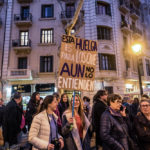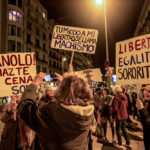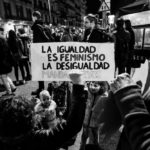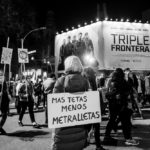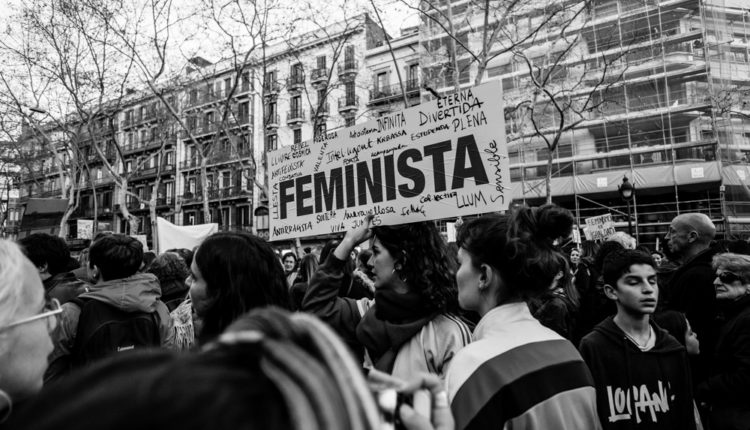
‘This march is for those who still don’t understand why we’re here’
BARCELONA, Spain – I have a very vivid memory of my adolescence. In one of my first trips to Coppelia — which was a traditional rite of initiation for a young girl going out for the first time without adult supervision — I found myself in a long line of people. Out of nowhere, suddenly, a stranger approached me and uttered words he thought flirtatious.
The invasion of my personal space was applauded by a friend who congratulated me because she thought that was proof that I was becoming a woman. I actually think it was my first experience about how in my own country the idea of the ‘weaker sex’ is validated.
Before setting foot in Plaza Espanya, one of the meeting points in Barcelona for the March 8 Women’s Day March, someone asked me why a Cuban woman had the need to “protest.” I thought to myself: And why not?
In Cuba, where 53.22 percent of the deputies in the National Assembly of People’s Power are women. Where, at 14, we become members of the Federation of Cuban Women — whether we want to or not. Where we have free and legal abortions, extended maternity leave and a paternity leave that, although unbeknownst to many, allows for the temporary care of the infant legally by both. Seeing these hard facts, you might think there’s nothing left to do.
To call oneself a feminist, even in 2019, is still questioned, especially if you’re Cuban. In a country where we enjoy the rights that many women worldwide lack, and for which they fight fiercely, it would seem unfortunate, even ungrateful. What more could we want, right?
My first encounter with feminism, its theories and debates, began at the university. I remember that it was a subject taught by a wonderful and brilliant teacher I had, Isabel Moya, now deceased, who made me think about the meaning of the “feminine universe” and its representations. She later taught me how to analyze myself, and my ‘otherness’ changed completely. Let me add that, years later, I still carry with me my thesis from that class.
My curiosity, as an up and coming maker of documentaries before such a mass event about which I had read so much in the past and had not had the opportunity to experience personally, was one of the strongest reasons for my participation in the International Women’s March. Twenty-four hours earlier, a teacher had told me how disappointed she was in the previous march because men had not been allowed in the front rows with women. With all this going through my head, I headed for the march.
I arrived at 6:30 p.m. without a camera, but with a cell phone in hand and two male photographer friends. And in fact, when they arrived, they were asked not to take the lead. What seemed shocking at first, I later understood, to a certain extent. Especially due to the media impact of the event. We continued, then, joining the crowd where the real protest was taking place.
Once inside — and taking photos anyway I could, and without much space left in my smart phone — the energy felt different. Women, children, men, the elderly, trans people, persons of different nationalities and ethnic groups, all agglomerated and wearing the color purple (which identifies the fight against gender violence) and green (for legal, safe and free abortion). There was something in the attitude of those present that was both joyful and determinant. Every single banner and song in that space was the representation of the feminine struggle. Entire families took to the streets.
Viva! Viva! the feminist struggle
At first I was self-conscious — same thing that always happens to me when I go somewhere new — but in less than 10 minutes I realized that I was precisely where I had to be. I felt safe, happy and accompanied by people I did not know and that I may never see again.
“On the way home I want to be free, not brave.” “Manolo, make yourself dinner by yourself tonight.” “Mom, tonight I will not be alone.” “If they touch one of us, they touch all of us.” “If something happens to me tonight, I want to be the last.”
The slogans, whether they be in Catalan, Spanish or English, became clear and understandable without the need to contextualize. They spoke to me, a Cuban woman with guaranteed rights. They referred to my mother, my sister, my friends, co-workers, my neighbors on First Street, and all the women who have surrounded me for 23 years. How is this possible in a place where feminism is not needed?
When claims of this magnitude break down language and cultural barriers, when they cross entire oceans, something happens. I knew it clearer than ever. Cuba is still part of a macho legacy and will continue to be for a long time if no action is taken. Unfortunately, a gift of roses and a poem will not solve the problems that Cuban women still face.
There’s nothing new here. My message has been repeated by many before me. I have read about similar experiences. The texts by Ailyn Torres Santana and Marta María Ramírez can attest to that.
On March 8, I was part of a bigger phenomenon, and despite the magnitude of it, I did not feel insignificant. Views on feminism are many, there is no reason to agree with them all. But that does not matter right now, not when there are so many different people united by the same goal: the recognition of women and respect for them as an active social individual.
Being feminist and Cuban is not contradictory. In fact, that day when I marched an idea floating in my mind became clear: it is necessary. Even in Cuba we still have a long way to go. Without neglecting the rights we already enjoy, it is becoming more and more pertinent to seek effective ways to change a macho identity that affects us as a society, and puts restrictions on our individual freedom in the most recondite and / or obvious forms.
If we were not able to march on March 8 like most of the rest of the world, then let’s do it tomorrow, next week, or next month. Demand public policies that confront harassment on the street, which often begins with the police personnel themselves. Let us demand that femicide be recognized as a serious problem in the country and that figures and statistics be made public. We know they exist and, still, they continue to hide them. Let’s discuss a woman’s doubleheader workday, a cultural legacy that demands that Cuban women be exemplary at their workplace and the lady of the house at home.
We must march so that the media develop content with the correct approach to gender — which does not necessarily consist of doing a story about a woman truck driver, for example. Let’s also march in solidarity with other women from around the world whose complaints may be different from afar, but who also support us.
If we do not march today, let’s march tomorrow. And as the Catalans say: “Visca Visca Visca la lluita feminista”. (Viva the feminist struggle.)
Daniella Fernández is a University of Havana social communications graduate. She is currently pursuing a postgraduate degree in Cinema and Television Screenplaywriting at Cine en Acción CSP, Barcelona.
Photos by Alejandro Alfonso Herrera.



